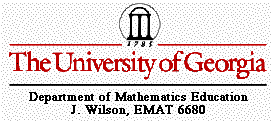


In an effort the explore the above products one need only construct the figure, take some measurements, and use the calculator all in GSP. Click HERE to explore with GSP. A sample of the GSP exploration page appears below.

It only takes one diagram to see that your conjecture is
![]()
but, naturally the difficult thing is to prove it!
Consider the line through points B and E and the line through points F and C and the projection of BF on FC, FA on BC, PA on FC, DP on FC, BC on FC, and DC on FC.

These projecions form a series of similar triangles.
Triangle HBC is similar to triangle LDC,
triangle HBF is similar to triangle KAF, and
triangle LDP is similar to triangle KAP.
All of these triangles are similar by Angle, Angle.
Using the similar triangles above we can now create proportions using the sides of the triangles.
Since triangle HBC is similar to triangle LDC,![]()
![]() .
.
Since triangle HBF is similar to triangle KAF, ![]()
![]() .
.
Since triangle LDP is similar to trinagle KAP ,![]()
![]() .
.
But that is not all of course since this series of proportions does not give you the desired proportion,
![]()
So now consider the line through points B and E and the projection of CE on BE, EA on BE, PA on FC, DP on BE, BD on BE, and BC on BE.

These projecions form a series of similar triangles.
Triangle AER is similar to triangle CEQ,
triangle PDS is similar to triangle PAR, and
triangle SDB is similar to triangle QCB.
All of these triangles are similar by Angle, Angle.
Using the similar triangles above we can now create proportions using the sides of the triangles.
Since triangle AER is similar to triangle CEQ, ![]()
![]()
triangle PDS is similar to triangle PAR ![]()
![]()
triangle SDB is similar to triangle QCB![]()
![]()
Now with these proportions and the previous set of proportions we can form the proportion
![]()
![]()
![]()
![]()
So all the ratios on the LHS cancel to give you one and on
the right hand side to give you the desired proportion. Hence,
![]() as desired.
as desired.
For another proof of CEVA'S THEOREM click HERE
For more about Tomasso CEVA click HERE.
To investigate what happens when P is outside
the triangle using GSP click HERE.
A sample of the GSP exploration page appears below.
To investigate the ratio of the areas of triangle ABC and triangle DEF using GSP click HERE. A sample of the GSP exploration page appears below.
